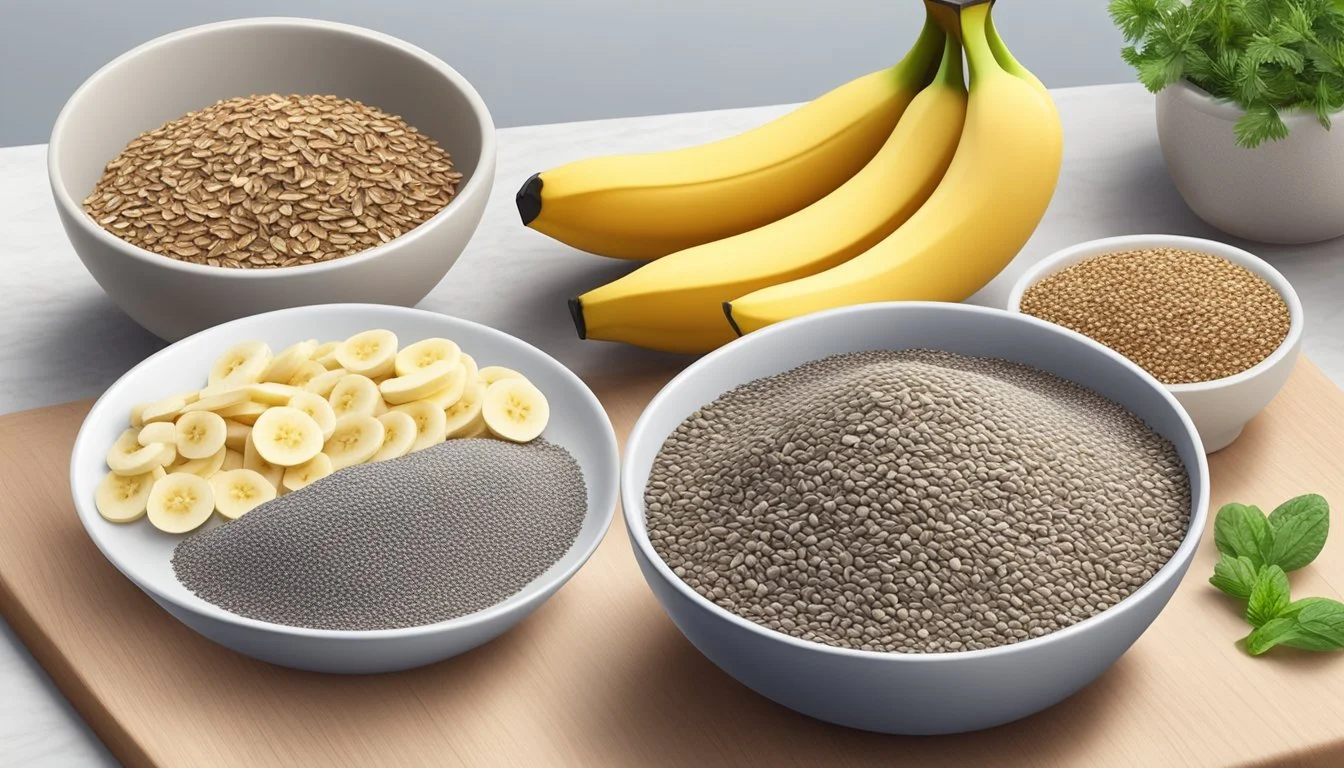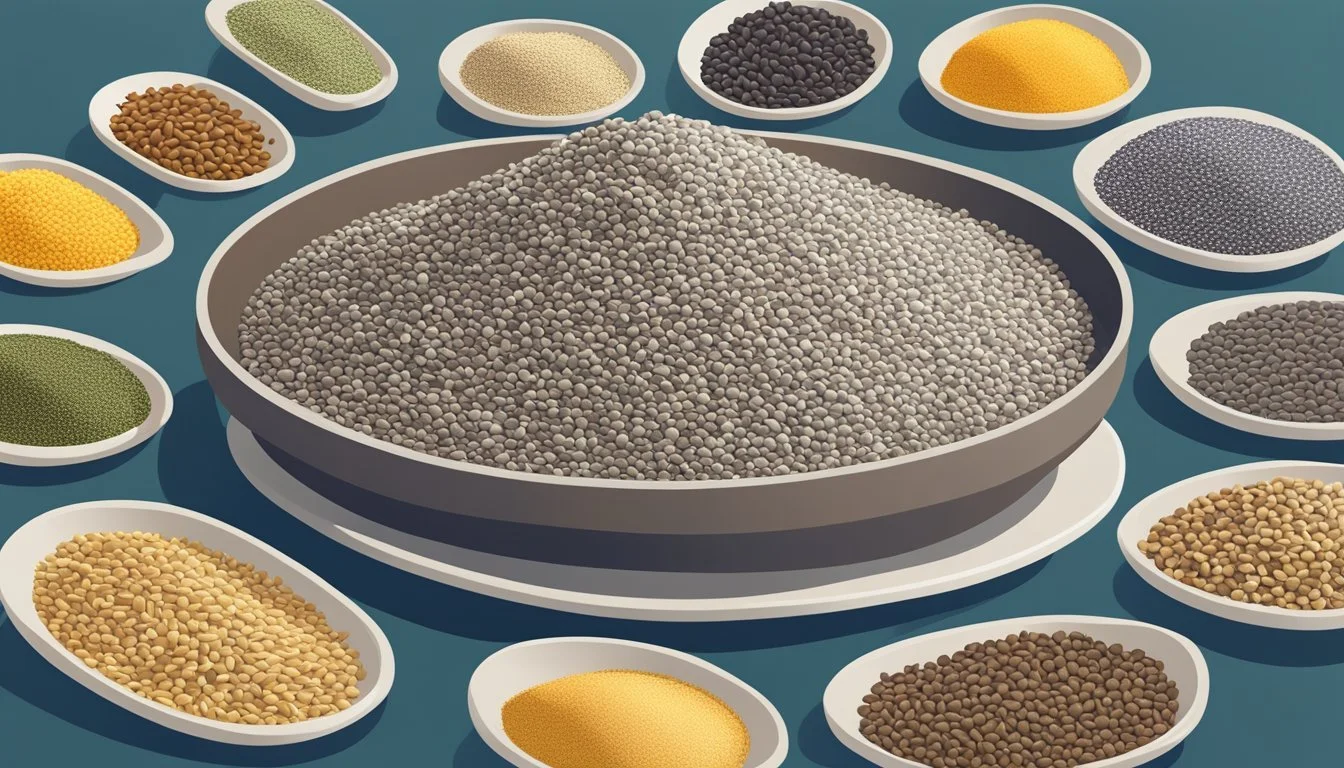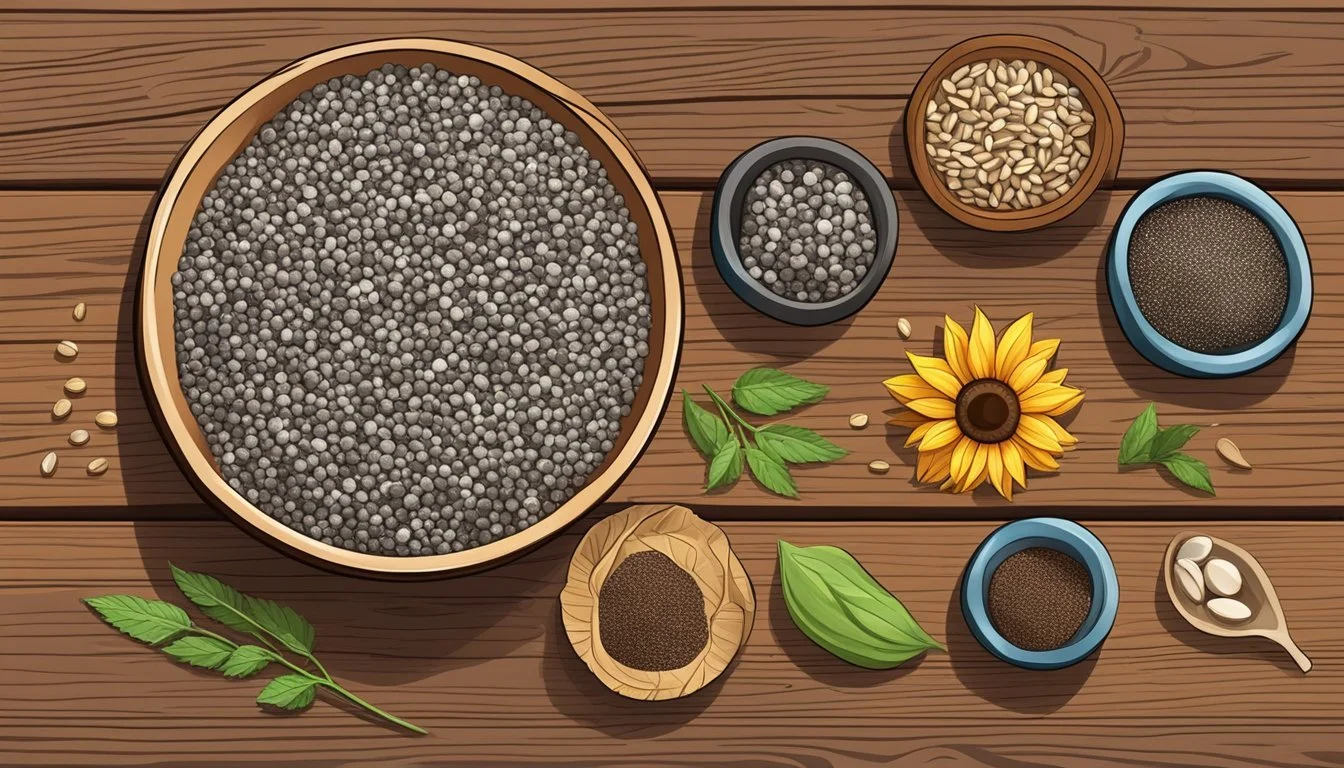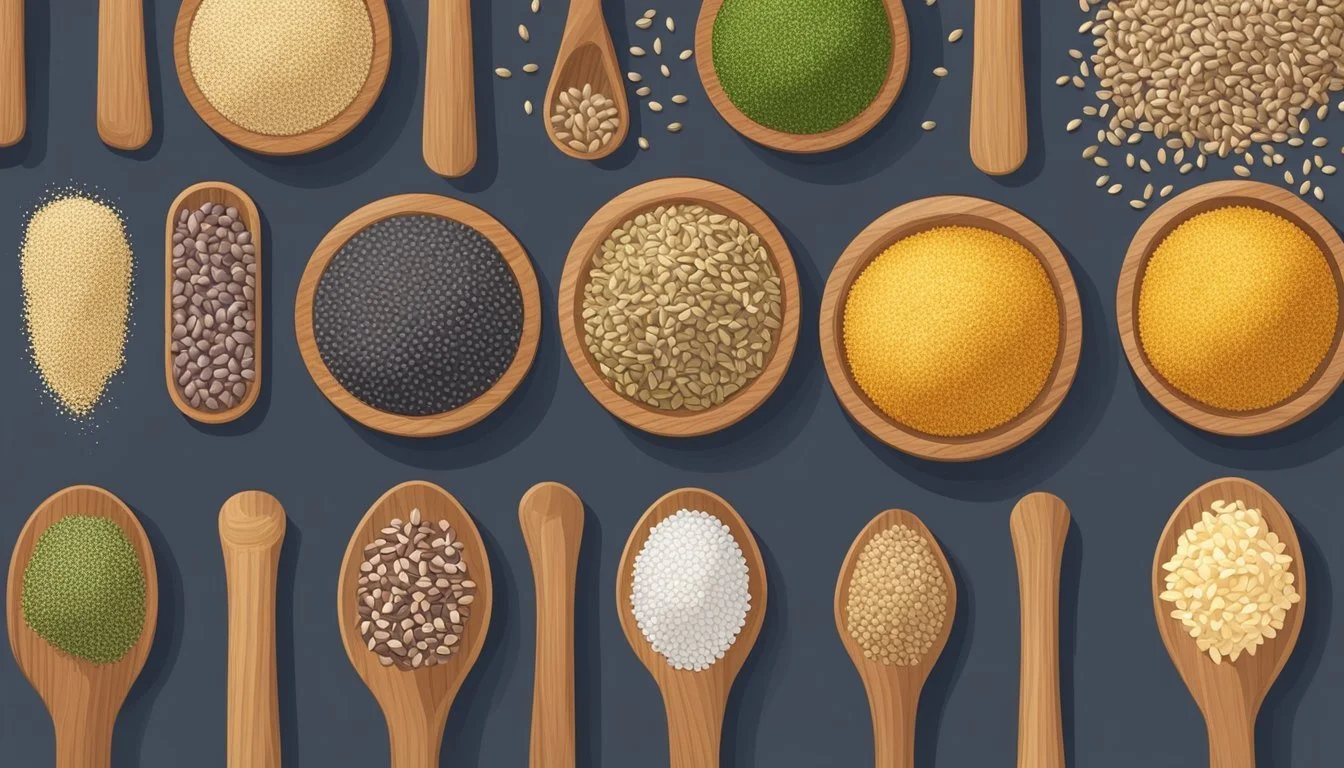Chia Seeds Substitutes
Top Alternatives for Every Recipe
Chia seeds have become a popular addition to many recipes due to their impressive nutritional profile and versatility in both savory and sweet dishes. Packed with fiber, omega-3 fatty acids, and essential nutrients, these tiny seeds offer substantial health benefits. Yet, there are times when you might need a substitute for chia seeds, whether due to allergies, dietary restrictions, or simply running out of them.
There are several healthy alternatives that can step in seamlessly for chia seeds. Flaxseeds, for example, make an excellent substitute because they share similar binding properties and are also rich in omega-3s and fiber. Eggs can be used as a binding agent in baking, mirroring the functional role of chia seeds in recipes. For those on a vegan diet, yogurt and applesauce can serve as nutrient-rich options that provide texture and moisture.
Exploring substitutes for chia seeds can add diversity to your diet while ensuring you still reap the health benefits. Ground flaxseeds, psyllium husks, and even hemp seeds can replicate not only the nutrient content but also the texture and binding characteristics that chia seeds are known for. Knowing these alternatives can make your cooking more flexible and nutritious.
Nutritional Profile of Chia Seeds
Chia seeds are celebrated for their dense nutritional content, which can significantly enhance a balanced diet.
Rich in fiber, chia seeds support digestive health and help maintain a feeling of fullness. Each serving of chia seeds (about 28 grams) contains approximately 11 grams of dietary fiber.
Protein is another key nutrient in chia seeds, making them a suitable addition for those looking to increase their protein intake. A 28-gram serving provides around 4 grams of protein.
Chia seeds are an excellent source of omega-3 fatty acids, which are essential for heart health. This same 28-gram serving offers about 5 grams of omega-3 fatty acids.
Vitamins and Minerals
Chia seeds pack a variety of vitamins and minerals:
Calcium: Vital for bone health; chia seeds deliver almost 18% of the daily recommended intake per 28 grams.
Magnesium: Supports numerous biochemical reactions in the body, with each serving containing 30% of the daily recommended value.
Iron: Essential for oxygen transport in the blood, providing around 12% of the daily recommended intake per 28-gram serving.
Potassium: Important for normal cell function, although chia seeds contribute a modest amount.
Zinc: Supports immune function, with a 28-gram serving offering around 7% of the daily recommended intake.
Chia seeds are therefore a nutrient-dense food that can contribute to various aspects of health thanks to their fiber, protein, omega-3 fatty acids, and an array of essential vitamins and minerals.
Health Benefits of Chia Seeds
Chia seeds offer numerous health benefits, particularly for digestive and heart health. These tiny seeds are packed with fiber, omega-3 fatty acids, and antioxidants that contribute to overall well-being.
Digestive Health
Chia seeds are incredibly rich in dietary fiber, with about 10 grams per ounce. This high fiber content aids in maintaining regular bowel movements and preventing constipation. The fiber in chia seeds also helps feed beneficial gut bacteria, promoting a healthy gut microbiome.
The gel-like substance that forms when chia seeds are soaked in water can aid in digestion. It slows down the digestive process, allowing for better nutrient absorption. This can help stabilize blood sugar levels and keep you feeling full longer, which may support weight management.
Heart Health
Chia seeds are an excellent source of omega-3 fatty acids, particularly alpha-linolenic acid (ALA). Omega-3 fatty acids are known to reduce inflammation, lower cholesterol levels, and improve overall cardiovascular health. Consuming chia seeds may lower the risk of heart disease.
They are also packed with antioxidants, which help protect the body from oxidative stress. This protection extends to the heart, as antioxidants can prevent damage to blood vessels and reduce the risk of chronic cardiovascular conditions. Incorporating chia seeds into a balanced diet can thus contribute significantly to heart health.
Culinary Uses of Chia Seeds
Chia seeds are incredibly versatile in culinary applications, functioning as a binding agent, an ingredient in baking, and a nutrient booster in beverages. Their capacity to absorb liquid and form a gel-like consistency makes them unique among common ingredients.
Chia as a Binding Agent
Chia seeds are often utilized as a binding agent, particularly in vegan recipes. When mixed with water, chia seeds form a gel known as a chia egg. This is especially useful in recipes requiring egg replacements. To make a chia egg, mix 1 tablespoon of chia seeds with 3 tablespoons of water and let it sit for 15 minutes. This mixture can replace one egg in baking recipes such as cookies, pancakes, or muffins. Additionally, chia seeds are used in making vegan meatballs, patties, and energy bars due to their binding properties.
Chia in Baking
In baking, chia seeds add both texture and nutritional value. Their high levels of omega-3 fatty acids, fiber, and protein make them a healthy addition to baked goods. Chia pudding, a popular dessert, combines chia seeds with milk or plant-based milk and is often sweetened with honey or maple syrup. Chia seeds can also be sprinkled on top of bread, muffins, or mixed into the dough. Their ability to retain moisture means they help keep baked goods fresh for longer periods. Additionally, chia seeds can serve as a topping for cookies, granola bars, and breakfast pastries, providing a crunch and a boost of nutrients.
Chia in Beverages
Chia seeds are commonly added to beverages for their health benefits and texture. When soaked, they swell and form a gel, making them a unique addition to drinks. Smoothies often incorporate chia seeds to enhance their thickness and nutritional profile. Simply add a tablespoon or two of chia seeds to your smoothie ingredients and blend. Chia seeds are also popular in health drinks such as chia fresca, made by soaking the seeds in water with a bit of lemon or lime juice. This drink is refreshing and hydrating, providing a nutritious alternative to sugary beverages.
Common Chia Seed Substitutes
When you need an alternative to chia seeds, there are several excellent options that can provide similar benefits, from thickening properties to nutritional value. Here, we’ll explore some of the most common and effective substitutes for chia seeds.
Flaxseeds as a Substitute
Flaxseeds are one of the most popular chia seed substitutes. They offer high levels of omega-3 fatty acids, fiber, and lignans. When ground and mixed with water, flaxseeds develop a gel-like consistency similar to chia seeds, making them excellent for baking and as an egg replacement in recipes.
Using ground flaxseeds rather than whole seeds ensures better nutrient absorption. The typical ratio is 1:1 when substituting chia seeds with flaxseeds, but you might need to let them sit in the water for a few minutes to achieve the desired texture.
Hemp Seeds as an Alternative
Hemp seeds are another great chia seed alternative. Rich in healthy fats, protein, and minerals, they enhance both the nutritional profile and texture of various dishes. However, unlike chia and flaxseeds, hemp seeds won't form a gel, so they are best used in recipes where thickening is not required.
These seeds are ideal for adding a crunchy texture and nutty flavor to salads, smoothies, and baked goods. For those looking to boost their protein intake, hemp seeds are particularly beneficial, adding a nutritional punch to your meals.
Other Seed Alternatives
Other seeds like pumpkin seeds, sunflower seeds, and sesame seeds can also serve as substitutes. Each type of seed offers unique textures and flavors:
Pumpkin seeds are rich in magnesium and antioxidants, lending a crunchy texture.
Sunflower seeds offer vitamin E and healthy fats, suitable for salads and snacks.
Sesame seeds enhance dishes with their nutty flavor and are rich in calcium.
These seeds do not mimic the gelling properties of chia seeds but can be used for their nutritional benefits and as textural additions.
Non-Seed Substitutes
For a non-seed alternative, items such as psyllium husk, quinoa, oats, banana, and plant-based yogurt are excellent choices.
Psyllium husk is an excellent thickener and binder, perfect for gluten-free baking.
Quinoa offers a complete protein source and can bulk up salads and bowls.
Oats provide soluble fiber and can be used in baking and as a thickener in recipes like overnight oats.
Mashed banana can act as a binder and adds natural sweetness to baked goods.
Plant-based yogurt is useful for adding creaminess and moisture to recipes, particularly in vegan dishes.
These alternatives can fill the gap where chia seeds are used, catering to different dietary needs or preferences.
Ingredients for Specific Dietary Needs
Finding suitable substitutes for chia seeds that cater to specific dietary needs, like vegan or gluten-free, can be essential for various recipes. Alternatives are available that match both nutritional content and functional properties.
Vegan and Vegetarian Options
For those following a vegan or vegetarian diet, flax seeds and hemp seeds are excellent alternatives to chia seeds. These seeds are rich in omega-3 fatty acids, fiber, and protein. Flax seeds can be ground and used in baking as a binding agent, while hemp seeds can be added to smoothies or salads for a nutrient boost.
Plant-based yogurt mixed with nut butter, such as almond or cashew butter, can be used as a chia seed substitute in recipes requiring thickening or binding properties. This combination provides the necessary texture and nutrients, making it ideal for vegan diets.
Gluten-Free Alternatives
For those needing gluten-free substitutes, consider using quinoa or psyllium husk. Quinoa provides a similar nutritional profile with high protein and fiber content. It can be used in both baked goods and as a thickening agent in soups or stews.
Psyllium husk, best known for its high fiber content, is effective as a binding agent in gluten-free baking. It absorbs water efficiently, creating a gel-like consistency similar to chia seeds. Both options ensure that recipes remain gluten-free while maintaining desired texture and nutritional quality.
Texture and Flavor Considerations
When choosing chia seed substitutes, one must consider how these ingredients might affect the texture and flavor of the final dish. Different alternatives offer unique qualities, both in terms of mouthfeel and taste, which can significantly alter a recipe.
Different Textures in Substitute Ingredients
Chia seeds are known for their ability to absorb liquid and form a gel-like consistency. Other ingredients can mimic this to varying degrees. Flaxseeds, when ground and mixed with water, create a similar gelatinous texture, making them ideal for recipes like puddings and smoothies.
Oat bran offers a more fibrous feel, adding bulk to energy bars and baked goods. It’s less gelatinous but excels in providing structure and binding.
Bananas and almond butter serve as excellent binders while contributing their own textures. Bananas lend a creamy, moist consistency, ideal for baked goods. Almond butter adds richness and a slightly gritty texture, enhancing both savory and sweet dishes.
Flavor Profiles of Chia Seed Substitutes
Chia seeds have a mild, slightly nutty flavor that’s generally unobtrusive. Substitutes vary widely in their flavor impact. Flaxseeds impart a nuttier taste, making them more pronounced in recipes. This can be a plus in items requiring a robust flavor.
Oat bran is relatively neutral but adds a slight earthiness. It’s versatile enough to blend into most dishes without overwhelming other flavors.
Bananas not only bind but also sweeten dishes naturally, adding a distinctive banana taste that works well in desserts and baked goods. On the other hand, almond butter adds a rich, nutty flavor, enhancing dishes with its depth and complexity.
Tapioca and pectin, often used for their gelling properties, have minimal flavor, allowing them to thicken foods without altering taste significantly.
Cooking and Baking with Chia Seed Substitutes
Chia seeds have many alternatives that can be used in various recipes to replicate their binding and nutritional properties. These substitutes can be seamlessly integrated into dishes such as baked goods, salads, and yogurt, offering flexibility for diverse dietary needs.
Modifying Recipes for Substitute Use
Flax Seeds:
Flax seeds, also known as linseeds, are rich in omega-3 fatty acids, protein, and fiber. To replace chia seeds, ground flaxseeds can be used similarly in recipes. Mix 1 tablespoon of ground flaxseeds with 3 tablespoons of water to create a gel-like consistency, perfect for binding in baked goods such as bread, muffins, and cakes.
Egg:
For those not following a vegan diet, eggs can easily substitute chia seeds. Replace the chia seed mixture with one egg to achieve the same binding effect in desserts and cakes. This substitution works particularly well in recipes where chia seeds are used for their binding properties rather than their nutritional profile.
Banana:
Mashed bananas are another effective chia seed replacement. Bananas add moisture and natural sweetness to baked goods such as muffins and cakes. Use one medium mashed banana to replace the chia seed mixture. This option not only ensures good binding but also enhances the flavor, making it a great choice for sweet treats.
Oat Bran:
Oat bran can serve as both a binder and a nutritional boost in recipes like patties, crackers, and energy bars. It provides fiber, protein, and a nutty flavor. Replace chia seeds with an equal amount of oat bran for a robust texture.
Yogurt:
In recipes like smoothies, oatmeal, and pudding, yogurt can be an excellent chia seed alternative. Yogurt adds creaminess and can bind ingredients together. Use a few tablespoons of yogurt to replace chia seeds, ensuring the mixture remains thick and cohesive. This is especially useful in breakfast dishes and snacks.
Storage and Preparation of Substitutes
When storing and preparing chia seed substitutes, it's key to maintain their nutritional value and usability.
Storage
Flax Seeds: Store whole flax seeds in a cool, dark place. Ground flaxseed should be kept in the refrigerator to maintain freshness.
Eggs: Keep refrigerated at all times and use within their expiration date.
Yogurt: Refrigerate and ensure it's properly sealed to prevent spoilage.
Preparation
Flax Seeds: To replace chia seeds, grind flax seeds into a fine powder using a blender or food processor. Mix one tablespoon of ground flaxseed with three tablespoons of water to create a gel-like consistency similar to chia seeds.
Eggs: Substitute one egg for every tablespoon of chia seeds. This works well for binding in baking recipes.
Yogurt: Use plain or Greek yogurt to substitute chia seeds in recipes. Approximately one-fourth cup of yogurt can replace one tablespoon of chia seeds.
All substitutes should blend seamlessly into most recipes, offering texture and nutritional benefits similar to chia seeds. Adjust proportions based on the specific requirements of each recipe to achieve the best results.
Historical Context and Cultural Significance
Chia seeds, derived from Salvia hispanica, have a history rooted in Central America. Ancient Aztecs and Mayans were among the first to cultivate and consume this tiny yet powerful seed.
Aztecs valued chia seeds not just as a food source but also for economic and religious purposes. They were often used as offerings to the gods and as currency.
The Mayans recognized chia for its robust sustenance qualities. Warriors consumed chia seeds for prolonged travel, relying on their lightweight, nutrient-dense properties.
Chia, from the Nahuatl word "chian," meaning oily, illustrates its high omega-3 fatty acid content, highlighting its superfood status even in ancient times.
Today, chia seeds are celebrated not only for their nutritional benefits but also for their cultural heritage, linking modern superfood trends to centuries-old traditions.







